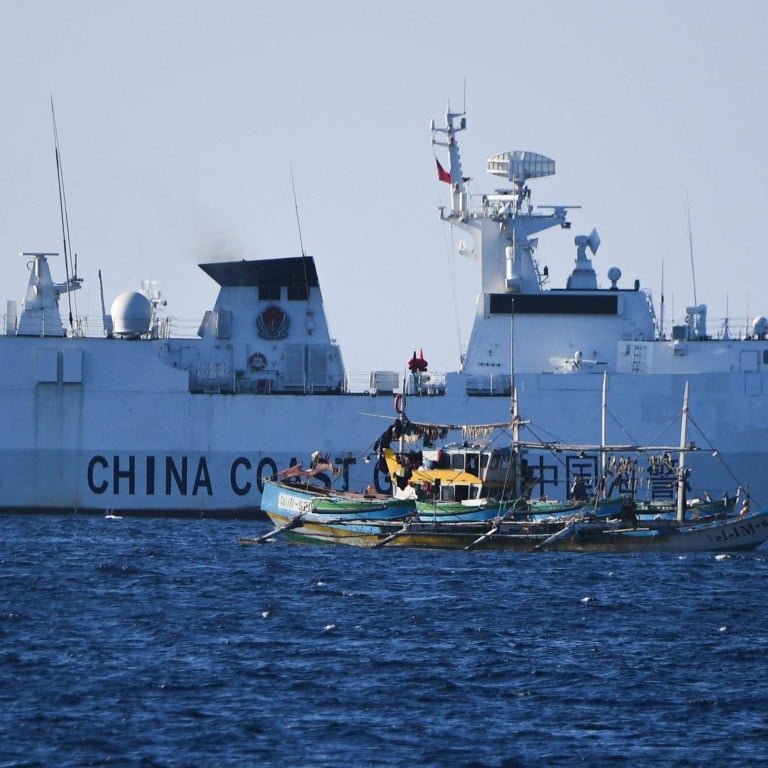24 Feb 2024 - {{hitsCtrl.values.hits}}
 Philippine President Ferdinand Marcos Jnr has pledged to take legal action against Beijing once it is proven that Chinese boats had used cyanide to “intentionally destroy” the fish-rich Scarborough Shoal in the disputed South China Sea.
Philippine President Ferdinand Marcos Jnr has pledged to take legal action against Beijing once it is proven that Chinese boats had used cyanide to “intentionally destroy” the fish-rich Scarborough Shoal in the disputed South China Sea.
Citing reports from Filipino fishermen, the Bureau of Fisheries and Aquatic Resources (BFAR) last week said Chinese and Vietnamese trawlers have been using the toxic substance in the shoal, locally known as Bajo de Masinloc.
China has controlled the atoll since 2012 and deployed a flotilla of fishing boats to the area ever since.
“If we feel that there is enough ground to do so, we will [pursue charges],” Marcos said, adding that cyanide use in Philippine waters was not uncommon.
“I do know that there are cases of cyanide fishing, even before, here in the Philippines. But I think the reason that it has been more alarming is that it has become more prevalent,” he said.
Jonathan Malaya, a spokesman of the National Security Council, said BFAR would work on gathering more evidence to back its claim, which China dismissed as “sheer fabrication”.
“The Chinese government attaches great importance to the protection of ecological environment and conservation of fishing resources and resolutely fights against fishing activities that violate laws and regulations,” its foreign ministry said.
BFAR spokesperson Nazario Briguera accused the Chinese fishermen of using cyanide to “intentionally destroy Bajo de Masinloc to prevent Filipino fishing boats from fishing in the area”.
Malaya said BFAR’s findings, if substantiated, could be sent to the Department of Justice and the Office of the Solicitor General for building a case on environmental destruction before an appropriate international tribunal.
“The challenge here is to prove the responsibility for the coral degradation and the impact to the environment is coming from these specific people,” he said.
Solicitor General Menardo Guevarra agreed with Malaya, saying “any legal action must be supported by strong, solid and competent evidence that can withstand the scrutiny of any international tribunal”.
Cyanide fishing involves the sprinkling of the deadly chemical compound near coral reefs to stun fish so they can be easily caught.
Fisherfolk group Pamalakaya criticised BFAR for “failing” to rein in the controversial fishing practice, the Philippine Daily Inquirer reported.
“Despite the evident poaching and other destructive fishing activities of foreign fishing vessels in the country’s territorial waters, the BFAR continues to fail to implement its own fishing laws to protect the marine resources and Filipino fisherfolk,” it said.
Scarborough Shoal has long been a key source of tension between the Philippines and China.
China’s coastguard drove away a BFAR vessel that it said “illegally intruded” into the waters adjacent to the shoal, state media reported on Thursday.
But a Philippine coastguard spokesman dismissed that claim.
“This statement is inaccurate. The BFAR vessel, BRP Datu Sanday, continues to patrol the waters of Bajo De Masinloc. Currently, the BFAR vessel is actively ensuring the security of Filipino fishermen in that area,” Commodore Jay Tarriela said on Thursday.
Last year, the Philippine coastguard removed a 300-metre-long barrier installed by China at the entrance to the strategic outcrop, which Manila says lies within its exclusive economic zone (EEZ), a 370km stretch of water where coastal states have exclusive rights to fish and other resources.
Beijing claims sovereignty over almost the entirety of the South China Sea – where the Philippines and several other nations have competing claims – and has rejected a 2016 international ruling that ruled in favour of Manila and found China’s assertions have no legal basis.
27 Jul 2024 9 minute ago
27 Jul 2024 3 hours ago
27 Jul 2024 4 hours ago
27 Jul 2024 6 hours ago
27 Jul 2024 7 hours ago